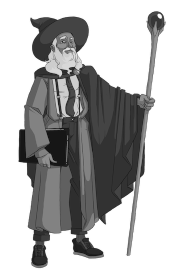Ospara player's guide
Play is usually every other Thursday at 7 PM, at my place. When we can't meet in person due to COVID (or any other reason), we'll play via Discord.
The tone I'm aiming for is high levels of whimsy and pop culture references, but played straight. So, ridiculous things can and will happen, but in game they'll be treated as though they're serious.
I tend to run theatre of the mind style, and not do battle maps.
Character creation
Roll 4d6 and drop the lowest die to generate your stats.
If you don't know what kind of character you want to make, I'm going to suggest your roll your stats in order, and then figure out who your character could be.
I don't care if you choose an alignment right away. Go for it if you want to, but I'm OK with you figuring your alignment out later, based on how your character acts.
All classes, races, and backgrounds in any official 5e book are available to you. If you want to play something from a third-party book, earlier edition, unearthed arcana article, etc., run it by me and we'll see if we can make it work.
The one thing I will insist on is that your character must have a motivation for staying with the group and going on adventures. We'll sort that out during character creation (session 0).
House rules
- Slow natural healing - You don't automatically regain hit points at the end of a long rest (DMG p.267).
- Lingering injuries - When you fail a death savings throw by 5 or more, you take a lingering injury (DMG p.272).
The Republic
Ospara is a republic, centred in Ospar, the Eternal City. It's very loosely based on Rome. Very loosely. The Republic is dominated by humans, but large cities in the Republic are cosmopolitan, and there are paths to citizenship for people of any ancestry.
The Republic spans across the middle of the continent, from east to west.
The campaign will begin in Westerbridge, a town in the westernmost province of the Republic. The province was conquered within the last few years, and citizens loyal to the Republic have been settling there of late. This is especially true for retired soldiers who have been given land there.
Other places
There are other human settlements, small kingdoms, free cities, etc., spread throughout the continent.
There's a forest Elf kingdom to the south of the Republic. They're pretty isolationist. There are no roads between the kingdom and any other nation, although they do have some port cities for trade. Other Elf kingdoms tend to be less isolationist.
Dwarves tend to live in the mountains to the east, and in caves and mines under ground, but also have a few city states. There's a faction of underground dwarves that believes that dwarves should never go to the surface, and shun any of its people who do so.
Halflings live close to human settlements. There are few Gnomes, and many of the Gnomes that do exist live in Halfling communities.
There is an area on the west coast, north of the Republic, called the Orclaw. This area was part of the Republic a hundred years ago, but was lost when a great plague spread through the continent and the Republic contracted due to its population loss. Orcs from the neighbouring continent have raided this area for centuries, and have settled it. There are humans in the Orclaw as well, and plenty of Half-Orcs.
Dragonborn are originally native to the same continent as the Orcs. A few Dragonborn have settled in and around the Republic, mostly on the outskirts.
Magic
Most people have some experience with magic, from having seen cantrips and low level spells performed, especially by Clerics (or Druids for rural folk). So, people aren't really afraid of magic, so much as they're respectful of the power it holds. That said, higher level magic is rare, and to many it's terrifying.
There are no magic item shops, not even in the biggest cities. There are magic brokers who can find magic items, and find buyers for magic items, for a fee.
Religion
The Greyhawk and non-human deities from the PHB exist in this world, as do the deities in Mordenkainen's Tome of Foes.
Travel
Most people don't travel much. When they do, most travel on foot, although people with the means will travel by mount, or a vehicle of some sort. Travel over long distances is typically safer by ship.
You can find inns in all but the smallest of human communities. Larger cities will have inns that work more like our modern hotels, with private rooms, and a menu of meals to choose from. Smaller inns offer beds in big rooms without much in the way of privacy, and your choice of eating the meal you're served or not.
